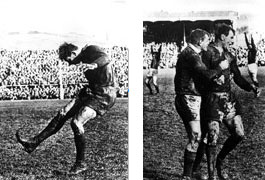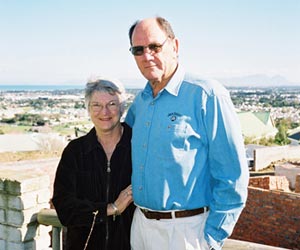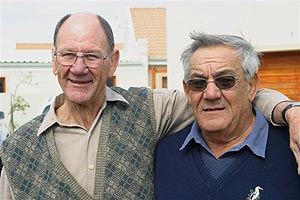But none of that matters because you're a kick away from beating the All Blacks.
The ball is sopping and shapeless as you place it on a pile of mud. The wetness weighs a ton. The posts sway out of focus. You stare off into the chilly haze, up above the Christchurch crowd, beyond the stands surrounding the frozen concrete of Lancaster Park.
A kick away from beating the All Blacks.
Below you is a pair of soaked black boots. Colin Meads, the legendary "Pinetree" himself, stands just a few metres away, staring at you through slits. A minute ago he gave away a penalty within kicking range. The captain has thrown you the ball. Offered you a gift of immortality.
Beating the All Blacks.
The scores are level, 16-all. Time's just about run out. You take a few steps back and those long studs sink deep into the earth. With mist for breath and ice for blood, you move forward. Boot strikes ball. Ball sails through the sticks.
It's September 4, 1965, and the All Blacks are beaten.
You tell yourself this is the moment you'll never forget – and for 30 years that’s what happens. After all, how could the events of such a day not sink into a man's psyche, like sharp studs into black mud? But then one day you wake up – and you can't quite remember what happened in your finest hour. The history you made becomes a muddy mix of distant memories. And those memories are no longer yours.
Archive pictures of the 1965 game against the All Blacks
Tiny and Monty
On September 4, 1937, Philip Nel's "Invincibles" won in Christchurch to set up what remains, to this day, the Springboks’ only away series victory over the All Blacks. Twenty-eight years later, to the day, Western Province lock Tiny Naudé kicked a penalty to give the men in green a 19-16 win against the odds in the third Test of the 1965 series.
Tiny will always be remembered for his match-winning kick against the All Blacks, but it was not the first or the last time the 1.96m lock would play a pivotal role in a Springbok victory. He played 14 Tests between 1963 and 1968, and on at least three occasions his booming boot was the difference between winning and losing. Tiny, like a modern-day Percy Montgomery, was indeed the man for the big occasion, the guy you could trust to kick the points that mattered.
Tiny made his debut in 1963 in the fourth Test against Australia in Port Elizabeth. The Boks, after prevailing in the first match, found themselves having to win to save the series, after losing consecutive Tests for the first time since 1891. Tiny's response? A try and a 45-metre penalty and so South Africa shared the series.
After the glory of September 4, 1965, in which he single-handedly ended the Boks' longest-ever losing streak of seven matches, Tiny returned in 1967 for a four-Test series against France. South Africa had lost eight of their last nine Tests, and hadn't beaten the Tricolores since 1952. Amazingly, since Tiny’s debut four years earlier, the team had won just one match – thanks to that kick.
Tiny contributed to a 2-1 series win with three of his trademark long-range penalties in the second and third Tests. The British Lions toured in 1968 for another four-Test series, and he was once again instrumental in setting the tone of a 3-0 Bok victory when he scored a try in the home side's 25-20 win in the first encounter.
Tiny Naudé scored a total of 47 points in Tests, made up of two tries, four conversions and 11 penalties.
Finding Tiny
Five years ago this week, I visited Tiny and his strong and dedicated wife, Miems, at their home in Somerset West – a place they had built 30 years earlier, back when there was “nothing here but farmland”.
By then, Tiny’s Alzheimer's was already advanced, and his condition deteriorated slowly but steadily over the next three years. "We take it from day to day," Miems told me that day in September 2003. "Tiny's lost lots of weight but he's still in good health. He still watches some rugby but not with a lot of interest. He can't follow what's going on. But when you ask him he'll say he didn't watch, or he doesn't know."
Miems and Tiny in 2003
Sadly, in his final days, Tiny could recall almost nothing about his stellar career.
Five years ago, I sat in his lounge and together we watched the videotape of his amazing feat. Back then, when everything became a little hazy, and my questions about Frik du Preez got a little confusing, there was always that kick – that moment of truth "a lifetime ago", as Tiny described it – that refused to drain from his memory bank.
I'm thankful to have heard the tale while the great man still remembered – and today I feel privileged to have been the last writer to hear the story from the man himself. This is how Tiny Naudé described his greatest day: "It was just mud, everywhere I looked. My whole body was just mud, and it was very cold. Most of our games in New Zealand were played in these conditions, and I think it had a lot to do with the losses we suffered in 1965. It was rare to find a field with grass on it! "
Looking back, the soft fields probably fitted my style of play. After we were awarded the penalty, wing Gert Brynard was talking to me. He said he wanted to take a quick one, but I said no, it's right at the end, Gert, I'm not taking a chance. Anyway, I'd actually already signalled I was going for poles so that was that.
"The way you placed the ball in the mud of New Zealand was different to the way you'd do it on the hard fields of South Africa. As you kicked, you'd sink so much deeper into the mud and if you teed the ball up like you did back home, you would have hit it too low down. I almost topped it, but it went straight and it went over. And that was that."
Tiny and 'old Frik'
On the screen, I watched as Tiny's team-mates rushed to congratulate him in a black-and-white world of yesteryear. The last time we spoke, Tiny wondered where life had taken them all, and whether any of them remembered that icy New Zealand afternoon. Only Gertjie still visited, Miems told me, only Gertjie and "old Frik", who once joked that they should go to the South African Rugby Union and "apply for back pay!"
Then, on a grey and drizzly Saturday in August 2005, as his blond-haired son threw himself against an All Black wall on the dark side of the world, Schalk Burger senior and Frik du Preez decided to look up an old friend.
“Even my children were saying that it had been a long time since they’d seen their father smile,” said Miems of the visit. “When Frik was here, Tiny was even laughing! It was amazing, Tiny’s reaction to him. He just had this connection with Frik. Tiny didn’t remember the other players. By then he didn’t even remember his own name. But he remembered Frik.”
Tiny and Frik du Preez during the 2005 visit
Tiny Naude’s gift from the sporting gods was a sopping ball wrapped in Christchurch clay, a piece of leather heavy with the weight of history. His feat remains preserved on a videotape his grandson simply labelled “Oupa se skop”.
Despite his illness, I still like to believe that Tiny sometimes remembered that kick. But could he really? Burger senior had no doubt. “Tiny was in a bad way when he went to see him, but when Frik arrived, it was amazing – it was as if, all of a sudden, he could remember everything again.”
Tiny Naudé spent most of that day holding tight his most prized possession: a gift from Du Preez, his autobiography Frik. Tiny wasn’t very interested in the pages of text but he couldn’t keep his eyes off the man on the cover. And every time he looked up and saw his great comrade – once his brother-in-arm in the Springbok second row – something stirred behind those sad eyes. After all, how could the memories of your greatest day not sink deep enough to leave at least a fragment of a footprint?
“Look,” said Tiny Naudé, his eyes fixed on his friend. “It’s you, Frik! It’s you!”
Jacobus Pieter ‘Tiny’ Naude died on 28 December 2006. He was 70 years old.
Duane Heath is a Cape Town based sportswriter. He writes a regular sports column for the Big Issue. duane@crossbarmedia.co.za
(Health24.com, updated September 2008)
Previous real-life story:
Reagan: A president's battle with Alzheimer's
For more information visit: Dementia SA: http://www.dementiasa.org/ or Alzheimer’s South Africa: http://www.alzheimers.org.za




 Publications
Publications
 Partners
Partners












